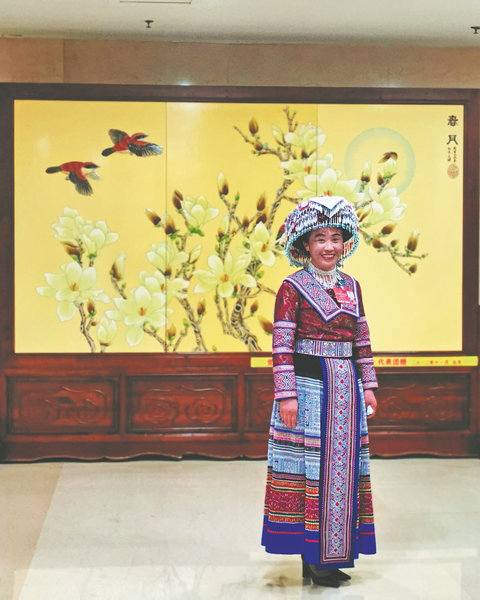
 i_need_contribute
i_need_contribute

Village doctor Yang Lianying, who is also a deputy to the National People's Congress, at the second session of the 14th NPC in Beijing. [Photo provided to China Daily]
Having worked as a village doctor for nearly two decades, Yang Lianying, a 44-year-old deputy to the 14th National People's Congress, stands out as a voice for her profession.
As one of the doctors in Henan village in the Honghe Hani and Yi autonomous prefecture in Yunnan province, Yang is responsible for 1,950 permanent residents, and checks their health regularly, registers their conditions, and informs them of issues like preventive injections and pregnancy examinations.
"My biggest hope is that villagers are healthy," says Yang, who has been an NPC deputy since 2018 and who has won praise from her community for her hard work and perseverance.
Born in Mengzi, Yunnan, in 1980, Yang was a farmer for many years before she began to receive medical training in 2005 in the hopes of making a better living.

Yang gives a medical lecture to people in Henan village, Honghe Hani and Yi autonomous prefecture, Yunnan province, last year. [Photo provided to China Daily]
Speaking about why she chose to become a doctor, she recalls an incident when she was about 8 years old when her mother went into shock as the result of an allergic reaction. With no village doctor, her family was forced to travel to a remote health center, where doctors managed to save her mother.
Although she now knows medicine could have helped avoid such a life-or-death situation, nobody knew this when she was young. The experience planted a seed in her heart and made her think that if she had a chance to learn medicine in the future, she would work hard, and maybe one day be able to help patients experiencing emergencies like her mother.
In 2008, Yang's dream came true when she was appointed as a doctor in Henan village, and made responsible for providing basic public health services, but she soon found out that it was not an easy job.
Since Henan village is located in a mountainous area and villagers live far apart, she often has to hike long distances to visit them at home and check on their health regularly.

Yang gives routine checkups to the village elderly. [Photo provided to China Daily]
Moreover, village doctors don't earn much, and have heavy workloads. Yang is responsible for the healthcare of the entire village of nearly 2,000 with one other colleague. Additionally, village doctors don't earn large pensions for life after retirement. Because of this, few young people are eager to step into the profession.
But Yang keeps going. "Actually, I love this job and regard all the difficulties I encounter as obstacles to conquer. I get on well with the villagers, and they trust and respect me. It's a great pleasure to hear them call me 'doctor'," she says.
She remembers treating one old woman with high blood pressure in 2021. Yang visited her regularly to check up on her and one day, as she took the woman's temperature, she found that she had a high fever, and that none of her family members were at home.
Yang gave the elderly woman some medicine and stayed with her to observe her situation and didn't leave until she was feeling better and family members had returned.

Yang gives routine checkups to the village elderly. [Photo provided to China Daily]
As she was about to leave, the elderly woman repeatedly expressed her gratitude, saying that Yang's visit had saved her life. She said that she had felt uncomfortable, but as nobody had been around, she had been unable to seek help since she was not able to walk or call anyone.
"I was touched by her words, and maybe that's what has helped me to keep doing this work," Yang says.
Her work as a doctor and NPC deputy has given her a double sense of responsibility, and she wants to speak for other village doctors.
"Although I am only a village doctor, I'm also participating in national affairs. As a result, I want to do a good job and set a good example," she says.
She has suggested that the government provide village doctors more support, especially in terms of pensions and medical training.
She has also suggested supporting education in remote border areas in terms of infrastructure and training. "Although education in the border areas has improved gradually, it's still not good enough. I have found students living in very narrow dorms, and there are not enough teachers," Yang says.